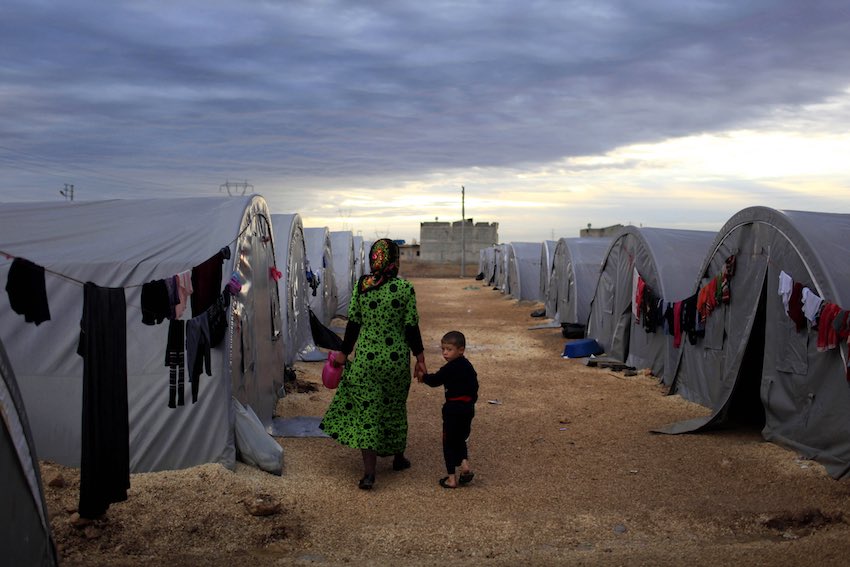
Photo Credit: Gokhan Sahin/Stringer
This year, I dedicated my monthly podcast, A Deeper Look, to examining humanitarian crises and emergency response. I had the opportunity to talk with senior leaders, youth and seasoned humanitarians who offered multiple perspectives on how this issue impacts communities and people in such areas as gender, technology, food security and education.
Although the topics covered in our conversations varied widely, my guests were unified in their belief that the nature of humanitarian crises has changed over the years. We are seeing historic levels of people who are displaced by conflict for longer periods than in the past, and the number of natural disasters is increasing. We discussed how the changing characteristics of these crises are radically altering the way we do development. My guests and I also talked about some of the courageous, innovative responses that give us hope for the future.
I encourage you to listen to, or revisit, the episodes on SoundCloud or iTunes and leave a comment or share your thoughts through social media. Although I have concluded this deeper look into humanitarian crises and emergency response, I welcome continued conversation on the topic.
If you haven’t been able to listen in yet, here are some key takeaways.
1. Refugees, asylum seekers, internally displaced people and migrants are not the same.
Commentators, journalists, government officials and even the experts often use the wrong terms to describe the groups affected by humanitarian crises. This confusion has had negative effects on policymaking and on how we organize and carry out response activities. Jana Mason, a senior advisor at the United Nations High Commissioner for Refugees, explains how. Listen here.
2. Conflict is counteracting hard-won gains in food security.
Matt Nims, the Acting Director of Food for Peace at the U.S. Agency for International Development, describes how, after 10 years of progress, conflict is reversing hard-won progress in increasing food security and leaving more people hungry. Listen here.
3. Education can be a ticket out of a conflict situation.
Saria Samakie, a Georgetown University student, Syrian refugee and co-founder of an educational nonprofit for youth in Jordan, reflects on the role that education played in his journey out of war-torn Aleppo. Listen here.
4. Building trust is a major challenge when coordinating a humanitarian response.
Dr. Ayoade Alakija, Nigeria’s Chief Humanitarian Coordinator, discusses the challenges of getting people with disparate interests to cooperate when power and control are at stake. Listen here.
5. Humanitarian crises often offer opportunities to empower women and alter restrictive gender norms.
It seems counterintuitive, but there can be unexpected windows of opportunity to create positive change for women during crises. Phumzile Mlambo-Ngcuka, the United Nations Under-Secretary-General and Executive Director of UN Women, describes how this happens. Listen here.
6. Crowdsourcing is gaining recognition as a serious method for gathering information about an emergency.
Crowdsourced reports have not been considered as reliable as “official” sources. Hend Alhinnawi, Co-founder and Chief Executive Officer of Humanitarian Tracker, explains that attitudes about crowdsourcing have evolved. Listen here.
7. Integrated development approaches are necessary in crisis situations.
Yemen is home to the world’s largest humanitarian crisis. Greg Beck, Director of Crisis Response and Integrated Development at FHI 360, discusses how integrated development approaches are meeting the need for basics, such as primary health care, nutrition, and water and sanitation services. Listen here.
8. To combat violent extremism, which feeds off of economic and political fragility, we must connect humanitarian assistance with security and diplomacy efforts.
Nancy Lindborg, President of the United States Institute of Peace, offers a solution for reducing the need for humanitarian assistance: Addressing the root causes of fragility. Listen here.
9. Humans have the power to prevent epidemics but often fail to respond fast enough.
Will an infectious disease outbreak stay local or become a catastrophic regional epidemic? Dr. Jonathan Quick, Senior Fellow Emeritus at Management Sciences for Health and author of the new book, The End of Epidemics: The Looming Threat to Humanity and How to Stop It, believes human action is at the heart of epidemic prevention. Listen here.
10. Presidential leadership counts in the delivery of U.S. humanitarian assistance.
U.S. presidents have used their influence to ensure the provision of aid at pivotal moments. Andrew Natsios, executive professor at the Bush School of Government and Public Service and director of the Scowcroft Institute of International Affairs at Texas A&M University, describes how President George H.W. Bush acted swiftly to support famine relief efforts in Ethiopia. Listen here.
11. Humility is an essential quality for anyone working in humanitarian response.
Ambassador Rick Barton, co-director of the Scholars in the Nation’s Service Initiative at Princeton’s Woodrow Wilson School and author of Peace Works: America’s Unifying Role in a Turbulent World, explains that listening to local people and recognizing that they are the experts will lead to stronger and more lasting solutions during a crisis. Listen here.
I encourage you to tune in next year, when our theme will focus on a topic that offers endless possibilities for discussion: the “darker side” of development. I will be looking at the paradoxes, the dilemmas and the unintended consequences of our efforts to do good work. I hope you will join me on this journey.
Listen to the full podcast below.

I appreciated your works here in Rwanda at gisenyi, I am in NYARUGURU district and I love to work with you to raise our development here in rural area.
thanks